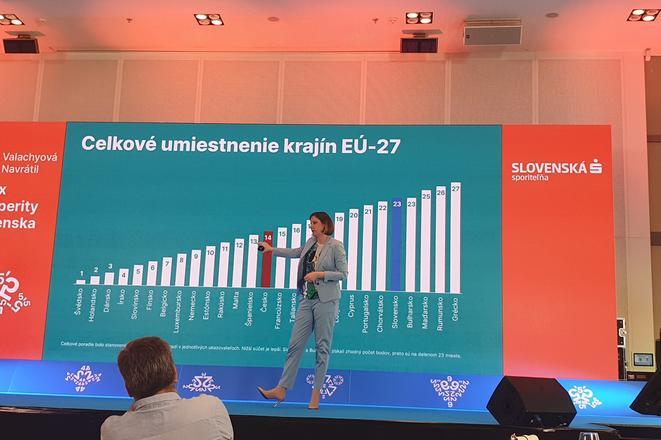Slovakia is one of the worst-performing EU countries in terms of overall prosperity, according to a ranking compiled by its largest retail bank. While the country placed 23rd (out of 27 member states) in the prosperity index compiled by Slovenská Sporiteľňa bank, the neigbouring Czech Republic emerged in 14th place.
Slovakia lags its former partner in most indicators, doing better only in sustainability and in income equality, where it was judged to be the least unequal country in the EU. The index features five main indicators: economy, society, households, education and sustainability.
“We have ended badly because Slovakia has made very few structural reforms in the last 10 years,” said Mária Valachyová, chief economist at Slovenská Sporiteľňa, when presenting the ranking on August 22.
Slovakia advanced significantly in terms of economic development and wealth after 2004, when Slovakia joined the EU. At that time, the country experienced a big transfer of technology and production in the private sector rocketed. However, these factors appear to have been largely exhausted and Slovaks have not been getting richer over the last decade as fast as they did in the preceding 10 years.
Slovakia has so far achieved a level of wealth equivalent to about 80% of the EU average, the prosperity index shows. But the results suggest that Slovaks have the fourth worst education system in the EU, and enjoy relatively few years of good health. Using the health-adjusted life expectancy (HALE) measure, i.e. the average number of years that a person can expect to live in full health, Slovaks record on average only 57 years. This is five years less than Czechs and 13 years less than Swedes, according to the index.
The main driver of prosperity should, under normal circumstances, be economic growth, say the index's authors.
“It is absolutely key to raising living standards,” said David Navrátil, chief economist at Česká Sporitelna, which is part of the same banking group, Erste, as Slovenská Sporiteľňa. “There is no other policy that is capable of doubling living standards within a generation.”
Analyses of long-term growth show that almost half of economic growth is influenced by innovation, a quarter by education and 15 percent by the right allocation of talent. These studies show that the best social and economic change are only achieved if government and business work together, Navrátil noted.
“To improve (Slovakia’s position), we will need to kick-start more significant changes, on the part of the state, but also on the part of companies, households and individuals,” said Valachyová. “We need to invest more, to educate ourselves more, to care more about our health. In terms of the economy, we should move towards production with higher added value.”
Slovenská Sporiteľňa's report does note that Slovakia appears to be slightly happier, with the country's ranking in the World Happiness Ranking rising from 45th in 2016 to 29th today, albeit still behind the Czech Republic.
The report's authors acknowledge what might seem to be a piece of good news: Slovakia's Gini coefficient, measuring income inequality, is the lowest in the EU, at 0.23. However, they suggest that even this is a reason for concern, concluding: "[Low income inequality] is not necessarily a completely desirable state, since more prosperous economies usually have a higher level of inequality. A fair distribution of income should take into account and reward the clever and hardworking."


